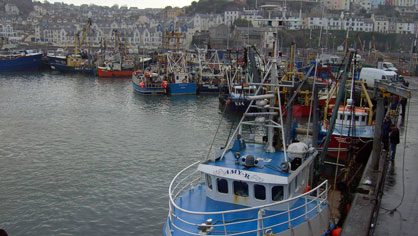22 March 2013
The unintended environmental consequences of fisheries displacement have been a central concern to the MPA Fishing Coalition (MPAC) in engaging in the Marine Conservation Zone (MCZ) planning process.
It should also be a central concern for conservationists, yet many have ignored it. Why is it important to conservation and what can be done about it?
No one disputes that wild capture fisheries have environmental consequences, although as a self-renewing resource requiring little human input they are inherently low impact compared to other forms of food production. However, if we are to accept they must continue in order to supply much needed protein to a growing world population, then it is logical that when making space for conservation through MCZs we should do so in a way that does not increase pressures exerted by the fishing fleet or undermine its ability to deliver maximum sustainable yields. This translates in planning terms to a set of unintended consequences that should, from a conservation perspective, be avoided:
- Displacement to areas that have been subject to less pressure and are therefore more likely to be in a pristine state, or to less resilient habitats from those areas where fisheries take place. Therefore aim not to select sites upon prime fishing grounds located on relatively resilient habitats.
- Displacement to less productive fishing areas where a greater amount of fishing effort is required in order to catch equivalent quantities of fish. Therefore aim to avoid areas where the greatest catches are harvested per unit area and/or unit effort.
- The locking up of significant productive resources that undermines the productivity of the remaining accessible resource and prevents maximum sustainable yields from being achieved. Therefore aim to avoid prime fishing grounds, particularly for those fisheries that are limited in their distribution.
This is not to take away from the purpose of MPAs to protect vulnerable, fragile and unique marine features, but conservationists must take heed if a network of MCZs are not to shoot their own cause in the foot. It is a regrettable fact that the 127 Marine Conservation Zone proposals currently subject to a public consultation were selected in the name of conservation without applying planning tools to avoid the displacement pitfalls identified above, and it is clear that the selection of some sites such as those located on prime areas of sustainable Nephrops/Dublin Bay prawn fishing grounds do not make the bar. MPAC members work to ensure that such problems do not happen again in the case of the Northern Ireland Marine Bill.
It is not too late to make amends in English territorial waters, and MPAC welcomes the fact that government has chosen not to proceed with the designation of sites en masse, but to take a more careful and considered approach. It should address the deficiencies of the early MCZ planning stages so that in due course the intended ecologically coherent network of MPAs that results can actually live up to its name, with win-wins for both conservation and sustainable seafood production. That has to be the true meaning of ecological coherence.

